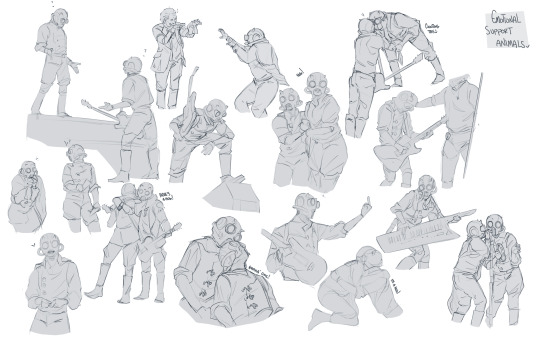#71/100
Text
Hisui
“Is the Tajiya life what you would like?”: Hisui remembers the day his mother asked him that question. The Tajiya were slaughtered, the family Hisui might have known killed by demons, his uncle paying unspoken penance for his part in it. So YES, Hisui too will rebuild.

8 notes
·
View notes
Photo

Meet Pippi!
She will be the new matriarch when she grows up and there will be no more children in the 5th generation.
I need to choose a neighborhood for her to live in and raise her children. It has to be a neighborhood I haven’t chosen for a generation yet.
Options (based on my current packs) are:
-Magnolia Promenade
-San Myshuno
-Strangerville
-Glimmerbrook
-Mt. Komorebi
Any thoughts?
2 notes
·
View notes
Text

71/100
Thought I was gonna play at one place tonight and ended up playing at another. It’s all good. I’m starting to realize it doesn’t really matter where I play, as soon as I start playing, I’m happy.
0 notes
Text
monumental day for india ireland the commonwealth and anime twitter
#queen elizabeth#uk politics#ireland#britain#india#71 100#mp100#commonwealth#tumblr sexyman poll#reigensweep#sansweep#reigen arakata#sans undertale#desi tag#indian cricket
2K notes
·
View notes
Text

I’ve been lamenting over hugs these past couple weeks and remembered that I actually have some on this warm up sheet of the ghoulies I’ve been slowly adding to 🫶 just a few more to catch up!
#disco doodles next I promise#sorry y’all I worked 115 hours last pay period and then 112 before that I’m DYING#I also think I’m gonna do a little sketch sheet for malevolent too#anyway I just nabbed screenshots from grainy TikTok videos for these#quick n messy 🥲 but there are some hugs…so I’m feeling a bit better#the band ghost#ghost#nameless ghouls#ghost ghoulettes#ghost ghouls#and one small papa 🫶#if you didn’t know. I GO HERE. I love this band 🫶#100hugs2023#hug 69/100#hug 70/100#hug 71/100#hug 72/100#hug 73/100
69 notes
·
View notes
Text


100 Days of Productivity [Day: 71] || 100 Jours de Productivitè [Jour: 71]
a place to put my feelings, & a memento from my mum. in whichever order you choose.
this week has me tired, so tired. but I wouldn't trade it for the world. often, as I approach the end of a semester, I often take time to look back to where I was - at the beginning; the quarter, the year, 10 years - not to compare, but simply to see the difference. I swore upon leaving my bachelors that I would never take up school again. yet here I am, & all the better for it.
review notes started
references found & annotated
freelance work caught up
emails answered
remote access set up
currently listening // Sweet Dear by La Hell Gang
un endroit où mettre mes sentiments, et un souvenir de ma mère. dans l'ordre que vous voulez.
cette semaine m'a fatiguée, tellement fatiguée. mais je ne l'échangerais pour rien au monde. souvent, alors que j'approche de la fin d'un semestre, je prends le temps de regarder où j'étais - au début ; le trimestre, l'année, les 10 ans - non pas pour comparer, mais simplement pour voir la différence. J'ai juré, en quittant ma licence, que je ne reprendrai jamais d'études. Pourtant, me voici, et c'est tant mieux.
révision notes commencées
références trouvées et annotées
travail en free-lance rattrapé
courriels répondu
accès à distance mis en place
chanson // Sweet Dear par La Hell Gang
#100 days of productivity#day 71#100dop#100 jours de productivité#jour 71#100jdp#studyblr#study motivation#studyspo#study aesthetic#study blog#bookish#gradblr
19 notes
·
View notes
Text
Queen Margaret (of Anjou) had written to the Common Council in November when the news of the Duke of York's coup was proclaimed. The letter from the queen was published in modernised English by M.A.E. Wood in 1846, and she dated it to February 1461 because of its opening sentence: ‘And whereas the late Duke of N [York]...." However the rest of the letter, and that of the prince, is in the present tense and clearly indicates that the Duke of York is still alive. The reference to the ‘late duke’ is not to his demise but to the attainder of 1459 when he was stripped of his titles as well as of his lands. If the queen’s letter dates to November 1460, and not February 1461, it make perfect sense. Margaret declared the Duke of York had ‘upon an untrue pretense, feigned a title to my lord’s crown’ and in so doing had broken his oath of fealty. She thanked the Londoners for their loyalty in rejecting his claim. She knew of the rumours,
that we and my lords sayd sone and owrs shuld newly drawe toward yow with an vnsome [uncounted] powere of strangars, disposed to robbe and to dispoyle yow of yowr goods and havours, we will that ye knowe for certeyne that . . . . [y]e, nor none of yow, shalbe robbed, dispoyled nor wronged by any parson that at that tyme we or owr sayd sone shalbe accompanied with
She entrusted the king's person to the care of the citizens ‘so that thrwghe malice of his sayde enemye he be no more trowbled vexed ne jeoparded.’ In other words the queen was well informed in November 1460 of the propaganda in London concerning the threat posed by a Lancastrian military challenge to the illegal Yorkist proceedings. Margaret assured the Common Council that no harm would come to the citizenry or to their property. Because the letter was initially misdated, it has been assumed that the queen wrote it after she realised the harm her marauding troops were doing to her cause, and to lull London into a false sense of security. This is not the case, and it is a typical example of historians accepting without question Margaret’s character as depicted in Yorkist propaganda. Margaret’s letter was a true statement of her intentions but it made no impact at the time and has made none since. How many people heard of it? The Yorkist council under the Earl of Warwick, in collusion with the Common Council of the city, was in an ideal position to suppress any wide dissemination of the letter, or of its content.
... When Margaret joined the Lancastrian lords it is unlikely that she had Scottish troops with her. It is possible that Jasper Tudor, Earl of Pembroke, sent men from Wales but there was no compelling reason why he should, he needed all the forces at his disposal to face Edward Earl of March, now Duke of York following his father’s death at Wakefield, who, in fact, defeated Pembroke at Mortimer’s Cross on 2 February just as the Lancastrian army was marching south. The oft repeated statement that the Lancastrian army was composed of a motley array of Scots, Welsh, other foreigners (French by implication, for it had not been forgotten that René of Anjou, Queen Margaret’s father, had served with the French forces in Nomandy when the English were expelled from the duchy, nor that King Charles VII was her uncle) as well as northern men is based on a single chronicle, the Brief Notes written mainly in Latin in the monastery of Ely, and ending in 1470. It is a compilation of gossip and rumour, some of it wildly inaccurate, but including information not found in any other contemporary source, which accounts for the credence accorded to it. The Dukes of Somerset and Exeter and the Earl of Devon brought men from the south and west. The Earl of Northumberland was not solely reliant on his northern estates; as Lord Poynings he had extensive holdings in the south. The northerners were tenants and retainers of Northumberland, Clifford, Dacre, the Westmorland Nevilles, and Fitzhugh, and accustomed to the discipline of border defence. The continuator of Gregory’s Chronicle, probably our best witness, is emphatic that the second battle of St Albans was won by the ‘howseholde men and feyd men.” Camp followers and auxiliaries of undesirables there undoubtedly were, as there are on the fringes of any army, but the motley rabble the queen is supposed to have loosed on peaceful England owes more to the imagination of Yorkist propagandists than to the actual composition of the Lancastrian army.
... Two differing accounts of the Lancastrian march on London are generally accepted. One is that a large army, moving down the Great North Road, was made up of such disparate and unruly elements that the queen and her commanders were powerless to control it.” Alternatively, Queen Margaret did not wish to curb her army, but encouraged it to ravage all lands south of the Trent, either from sheet spite or because it was the only way she could pay her troops.” Many epithets have been applied to the queen, few of them complimentary, but no one has as yet called her stupid. It would have been an act of crass stupidity wilfully to encourage her forces to loot the very land she was trying to restore to an acceptance of Lancastrian rule, with her son as heir to the throne. On reaching St Albans, so the story goes, the Lancastrian army suddenly became a disciplined force which, by a series of complicated manoeuvres, including a night march and a flank attack, won the second battle of St Albans, even though the Yorkists were commanded by the redoubtable Earl of Warwick. The explanation offered is that the rabble element, loaded down with plunder, had descended before the battle and only the household men remained. Then the rabble reappeared, and London was threatened. To avert a sack of the city the queen decided to withdraw the army, either on her own initiative or urged by the peace-loving King Henry; as it departed it pillaged the Abbey of St Albans, with the king and queen in residence, and retired north, plundering as it went. Nevertheless, it was sufficiently intact a month later to meet and nearly defeat the Yorkist forces at Towton, the bloodiest and hardest fought battle of the civil war thus far. The ‘facts’ as stated make little sense, because they are seen through the distorting glass of Yorkist propaganda.
The ravages allegedly committed by the Lancastrian army are extensively documented in the chronicles, written after the event and under a Yorkist king. They are strong on rhetoric but short on detail. The two accounts most often quoted are by the Croyland Chronicle and Abbott Whethamstede. There is no doubting the note of genuine hysterical fear in both. The inhabitants of the abbey of Crowland were thoroughly frightened by what they believed would happen as the Lancastrians swept south. ‘What do you suppose must have been our fears . . . [w]hen every day rumours of this sad nature were reaching our ears.’ Especially alarming was the threat to church property. The northern men ‘irreverently rushed, in their unbridled and frantic rage into churches . . . [a]nd most nefariously plundered them.’ If anyone resisted ‘they cruelly slaughtered them in the very churches or churchyards.’ People sought shelter for themselves and their goods in the abbey,“ but there is not a single report of refugees seeking succour in the wake of the passage of the army after their homes had been burned and their possessions stolen. The Lancastrians were looting, according to the Crowland Chronicle, on a front thirty miles wide ‘like so many locusts.“ Why, then, did they come within six miles but bypass Crowland? The account as a whole makes it obvious that it was written considerably later than the events it so graphically describes.
The claim that Stamford was subject to a sack from which it did not recover is based on the Tudor antiquary John Leland. His attribution of the damage is speculation; by the time he wrote stories of Lancastrian ravages were well established, but outside living memory. His statement was embellished by the romantic historian Francis Peck in the early eighteenth century. Peck gives a spirited account of Wakefield and the Lancastrian march, influenced by Tudor as well as Yorkist historiography.
… As late as 12 February when Warwick moved his troops to St Albans it is claimed that he did not know the whereabouts of the Lancastrians, an odd lack of military intelligence about an army that was supposed to be leaving havoc in its wake. The Lancastrians apparently swerved to the west after passing Royston which has puzzled military historians because they accept that it came down the Great North Road, but on the evidence we have it is impossible to affirm this. If it came from York via Grantham, Leicester, Market Harborough, Northampton and Stony Stratford to Dunstable, where the first engagement took place, there was no necessity to make an inexplicable swerve westwards because its line of march brought it to Dunstable and then to St Albans. The Lancastrians defeated Warwick’s army on 17 February 1461 and Warwick fled the field. In an echo of Wakefield there is a suggestion of treachery. An English Chronicle tells the story of one Thomas Lovelace, a captain of Kent in the Yorkist ranks, who also appears in Waurin. Lovelace, it is claimed, was captured at Wakefield and promised Queen Margaret that he would join Warwick and then betray and desert him, in return for his freedom.
Lt. Colonel Bume, in a rare spirit of chivalry, credits Margaret with the tactical plan that won the victory, although only because it was so unorthodox that it must have been devised by a woman. But there is no evidence that Margaret had any military flair, let alone experience. A more likely candidate is the veteran captain Andrew Trolloppe who served with Warwick when the latter was Captain of Calais, but he refused to fight under the Yorkist banner against his king at Ludford in 1459 when Warwick brought over a contingent of Calais men to defy King Henry in the field. It was Trolloppe’s ‘desertion’ at Ludford, it is claimed, that forced the Yorkists to flee. The most objective and detailed account of the battle of St Albans is by the unknown continuator of Gregory’s Chronicle. The chronicle ends in 1469 and by that time it was safe to criticise Warwick, who was then out of favour. The continuator was a London citizen who may have fought in the Yorkist ranks. He had an interest in military matters and recorded the gathering of the Lancastrian army at Hull, before Wakefield, and the detail that the troops wore the Prince of Wales’ colours and ostrich feathers on their livery together with the insignia of their lords. He had heard the rumours of a large ill-disciplined army, but because he saw only the household men he concluded that the northerners ran away before the battle. Abbot Whethamstede wrote a longer though far less circumstantial account, in which he carefully made no mention of the Earl of Warwick.
… Margaret of Anjou had won the battle but she proceeded to lose the war. London lay open to her and she made a fatal political blunder in retreating from St Albans instead of taking possession of the capital.' Although mistaken, her reasons for doing so were cogent. The focus of contemporary accounts is the threat to London from the Lancastrian army. This is repeated in all the standard histories, and even those who credit Margaret with deliberately turning away from London do so for the wrong reasons.
... The uncertainties and delays, as well as the hostility of some citizens, served to reinforce Margaret’s belief that entry to London could be dangerous. It was not what London had to fear from her but what she had to fear from London that made her hesitate. Had she made a show of riding in state into the city with her husband and son in a colourful procession she might have accomplished a Lancastrian restoration, but Margaret had never courted popularity with the Londoners, as Warwick had, and she had kept the court away from the capital for several years in the late 1450s, a move that was naturally resented. Warwick’s propaganda had tarnished her image, associating her irrevocably with the dreaded northern men. There was also the danger that if Warwick and Edward of March reached London with a substantial force she could be trapped inside a hostile city, and she cannot have doubted that once she and Prince Edward were taken prisoner the Lancastrian dynasty would come to an end. Understandably, at the critical moment, Margaret lost her nerve.
... Queen Margaret did not march south in 1461 in order to take possession of London, but to recover the person of the king. She underestimated the importance of the capital to her cause." Although she had attempted to establish the court away from London, the Yorkist lords did not oppose her for taking the government out of the capital, but for excluding them from participation in it. Nevertheless London became the natural and lucrative base for the Yorkists, of which they took full advantage. The author of the Annales was in no doubt that it was Margaret’s failure to enter London that ensured the doom of the Lancastrian dynasty. A view shared, of course, by the continuator of Gregory’s Chronicle, a devoted Londoner:
He that had Londyn for sake
Wolde no more to hem take
The king, queen and prince had been in residence at the Abbey of St Albans since the Lancastrian victory. Abbot Whethamstede, at his most obscure, conveys a strong impression that St Albans was devastated because the Lancastrian leaders, including Queen Margaret, encouraged plundering south of the Trent in lieu of wages. There must have been some pillaging by an army which had been kept in a state of uncertainty for a week, but whether it was as widespread or as devastating as the good abbot, and later chroniclers, assert is by no means certain. Whethamstede is so admirably obtuse that his rhetoric confuses both the chronology and the facts. So convoluted and uncircumstantial is his account that the eighteenth century historian of the abbey, the Reverend Peter Newcome, was trapped into saying: ‘These followers of the Earl of March were looked on as monsters in barbarity.’ He is echoed by Antonia Gransden who has ‘the conflict between the southemers of Henry’s army and the nonherners of Edward’s. The abbey was not pillaged, but Whethamstede blackened Queen Margaret’s reputation by a vague accusation that she appropriated one of the abbey’s valuable possessions before leaving for the north. This is quite likely, not in a spirit of plunder or avarice, but as a contribution to the Lancastrian war effort, just as she had extorted, or so he later claimed, a loan from the prior of Durham earlier in the year. The majority of the chroniclers content themselves with the laconic statement that the queen and her army withdrew to the north, they are more concerned to record in rapturous detail the reception of Edward IV by ‘his’ people. An English Chronicle, hostile to the last, reports that the Lancastrian army plundered its way north as remorselessly as it had on its journey south. One can only assume that it took a different route.
The Lancastrian march ended where it began, in the city of York. Edward of March had himself proclaimed King Edward IV in the capital the queen had abandoned, and advanced north to win the battle of Towton on 29 March. The bid to unseat the government of the Yorkist lords had failed, and that failure brought a new dynasty into being. The Duke of York was dead, but his son was King of England whilst King Henry, Queen Margaret and Prince Edward sought shelter at the Scottish court. The Lancastrian march on London had vindicated its stated purpose, to recover the person of the king so that the crown would not continue to be a pawn in the hands of rebels and traitors, but ultimately it had failed because the Lancastrian leaders, including Queen Margaret, simply did not envisage that Edward of March would have the courage or the capacity to declare himself king. Edward IV had all the attributes that King Henry (and Queen Margaret) lacked: he was young, ruthless, charming, and the best general of his day; and in the end he out-thought as well as out-manoeuvred them.
It cannot be argued that no damage was done by the Lancastrian army. It was mid-winter, when supplies of any kind would have been short, so pillaging, petty theft, and unpaid foraging were inevitable. It kept the field for over a month and, and, as it stayed longest at Dunstable and in the environs of St Albans, both towns suffered from its presence. But the army did not indulge in systematic devastation of the countryside, either on its own account or at the behest of the queen. Nor did it contain contingents of England’s enemies, the Scots and the French, as claimed by Yorkist propaganda. Other armies were on the march that winter: a large Yorkist force moved from London to Towton and back again. There are no records of damage done by it, but equally, it cannot be claimed that there was none.
-B.M Cron, "Margaret of Anjou and the Lancastrian March on London, 1461"
#*The best propaganda narratives always contain an element of truth but it's important to remember that it's never the WHOLE truth#margaret of anjou#15th century#english history#my post#(please ignore my rambling tags below lmao)#imo the bottom line is: they were fighting a war and war is a scourge that is inevitably complicated and messy and unfortunate#arguing that NOTHING happened (on either side but especially the Lancastrians considering they were cut off from London's supplies)#is not a sustainable claim. However: Yorkist propaganda was blatantly propaganda and I wish that it's recognized more than it currently is#also I had *no idea* that her letter seems to have been actually written in 1460! I wish that was discussed more#& I wish Cron's speculation that Margaret may have feared being trapped in a hostile city with an approaching army was discussed more too#tho I don't 100% agree with article's concluding paragraph. 'Edward IV did not ultimately save England from further civil war' he...did???#the Yorkist-Lancastrian civil war that began in the 1450s ended in 1471 and his 12-year reign after that was by and large peaceful#(tho Cron may he talking about the period in between 61-71? but the civil war was still ongoing; the Lancasters were still at large#and the opposing king and prince were still alive. Edward by himself can hardly be blamed for the civil war continuing lol)#but in any case after 1471 the war WAS believed to have ended for good and he WAS believed to have established a new dynasty#the conflict of 1483 was really not connected to the events of the 1450s-1471. it was an entirely new thing altogether#obviously he shouldn't be viewed as the grand undoubted rightful savior of England the way Yorkist propaganda sought to portray him#(and this goes for ALL other monarchs in English history and history in general) but I don't want to diminish his achievements either#However I definitely agree that the prevalent idea that the Lancasters wouldn't have been able to restore royal authority if they'd won#is very strange. its an alternate future that we can't possibly know the answer to so it's frustrating that people seem to assume the worst#I guess the reasons are probably 1) the Lancasters ultimately lost and it's the winners who write history#(the Ricardians are somehow the exception but they're evidently interested in romantic revisionism rather than actual history so 🤷🏻♀️)#and 2) their complicated former reign even before 1454. Ig put together I can see where the skepticism comes from tho I don't really agree#but then again the Yorkists themselves played a huge role in the chaos of the 1450s. if a faction like that was finally out of the way#(which they WOULD be if the Lancasters won in 1461) the Lancastrian dynasty would have been firmly restored and#Henry and Margaret would've probably had more space and time to restore royal authority without direct rival challenges#I'd argue that the Lancasters stood a significantly better chance at restoring & securing their dynasty if they won here rather than 1471#also once again: the analyses written on Margaret's queenship; her role in the WotR; and the propaganda against her are all phenomenal#and far far superior than the analyses on any other historical woman of that time - so props to her absolutely fantastic historians
19 notes
·
View notes
Text

march 12
57 notes
·
View notes
Text
I need Americans to stop weighing in on the UKs indoor vs outdoor cat debate until they read up on our biodiversity crisis and learn exactly why our wildlife decline is so serious (spoiler: it's not the cats)
#im all for advocating for indoor cats but americans please listen to us when we tell you its not what will save our wildlife. please#except in scotland with scottish wildcats. if youre gonna go hard on us for indoor cats focus on that. please#the UKs situation is entirely different to america and wont listen when we tell them this but they love to talk as if we're stupid#hold our government accountable. hold our landowners accountable. please#13% woodland cover left in the uk and only 25% is ancient. 71% farmland cover and agriculture is so intensive it cannot sustain our wildlife#the government is polluting our waters. pesticides are polluting our waters#THAT is why our wildlife is dying#cats have been here for 1600 years and the wildlife decrease has only been significant within the last 100 or so. 41% since 1970#it aint the cats. i know its hard for americans to accept. but listen to us. it aint the cats#would it help? yes of course and thats why im still for it. is it going to solve our biodiversity crisis? absolutely not and it never will
10 notes
·
View notes
Text
Sorry to the Joshua Gillespie stans but
He is not the smartest person in the podcast
He made a bad decision (accepting the coffin despite realising it could be drugs) then made a good decision (not opening it/freezing the key)
Just like so many other surviving statement givers!
Georgie Barker? Bad decision (going to the lab), good decision (covering her ears)
Karolina Górka? Bad decision (getting on the bad vibes train), good decision (lying on the ground)
Mfing,, Robin whatever his surname was from mag 100?? Bad decision (followed his dog into the spiral thing idk), good decision (left bc he had dinner)
There are so many others!!!
Now this isn't to say he's not smart, the good decision has to be made otherwise the statement giver is someone else or they die some time after giving the statement. Joshua is smart. Just not the smartest.
#if it isn't clear that I haven't listened to tma in over a year.... that's why I have so few examples....#tma fandom stop giving joshua all the credit when there are equally smart women right there please#tma#the magnus archives#mag 2#mag 94#mag 71#mag 100#joshua gillespie#I don't actually hate Joshua#the joke hatered is amplified every time someone acts like he's the best tho
227 notes
·
View notes
Text

I’m trying to train her mane to this side, no luck yet
#blm mustang#mustang horse#horse#equestrian#thea#horseblr#mustang#number 70/100 was lost to the ages#number 71/100 I didn’t post about#so this makes#number 72/100 was a good arena ride with a lot of pole work and then a gallop on the trails at dusk
14 notes
·
View notes
Text



🐚 day 71 of 100 productivity challenge Monday March 11 🌊
It's been a while since I last wrote down something about my productivity, a very long time passed, the last time was February and now we are in March, near spring season so here I am.
In this time I have completed the thesis, I have revised and corrected it several times and I am currently waiting for confirmation to be able to send the thesis to the secretariat of my university and then print it in paper form and complete the last things necessary for the day of the discussion that gets closer little by little.
In the same period I had a prolonged burn out, from which I still haven't completely emerged. I try to take the time necessary to recover by restarting my routine as well as pampering myself with cooking, small rewards and relaxation.
Yesterday I proceeded to prepare the aubergines parmesan, for today lunch, and fortunately since it took me more than an hour and a half to fix the mechanism that allows my home gate to open and close automatically, but I am satisfied with the work done, a little sore, but satisfied.
I also have the time for doing my handwriting exercises, for study the patent theory and doing quizzes; I restart reading my book and I do my nails pink or a sort of orange-pink (I know it seems red). I treat my body and my spirit.
I feel a little bit tired, but satisfied. Tomorrow will be better.
#day 71 of productivity#productivity#100 days of productivity#productivity challenge#challenge#life#vita#amore#love#umi-no-onnanoko#self care#self improvement#self love#take care#take care of myself#building myself#single lady
5 notes
·
View notes
Text
I love fcg so much they're officially the silly little guy of all time
#im on episode 71 and absolutely obsessed#cant believe i spent months falling behind on c3 when this guy is there#what was i thinking#(also definitely going to complete my goal of being caught up before episode 100 lets gooooo)#cr3 catch up
3 notes
·
View notes
Text
one of my posts from SEPTEMBER broke containment, and it went about as well as you'd expect.
#“breaking containment” for me is when a post hits 100 notes fwiw#in hindsight i should not have engaged and given that i did engage i should have blocked#will i learn from this? probably not#one thing about me is that my inability to remember a single god damn thing makes me inconsistent#anyway i sure do love being talked down to as if i am singlehandedly gatekeeping the bg3 fandom and making people feel unwelcome in it#i'm sorry that my (checks notes) 71 follower account with less than 150 notes on this post didn't measure up to your standards#when i was literally venting in the first place#az talks#more like az screams#posts into oblivion
2 notes
·
View notes
Note
Just found out that the fragrance pierre gasly wears is £850. Now I lowkey wanna know how much devon charges for his...
no wonder yuki can identify him by scent alone. for £850 i should HOPE he’s fucking pungent
15 notes
·
View notes
Text
my favorite theme in mag is watching entities show mercy to victims with high affinities to themselves
#this post is brought to you by#episode 100#episode 71#and#episode 72#the fears let them go because they were in some way affiliated with it#the magnus archives#tma
4 notes
·
View notes